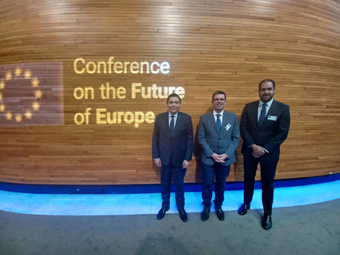Press Office
Strasbourg, 10 April 2022
Hellenic Parliament delegation at 6th Plenary of Conference on the Future of Europe
 The 6th Plenary session of the Conference on the Future of Europe concluded yesterday in Strasbourg (7-9 April). Work was conducted during the plenary, as well as the working groups, the political groups and the four components of the conference. The Hellenic Parliament was represented by a delegation consisting of Mr Dimitris Kairidis, Mr Ioannis Kefalogiannis and Mr Ioannis Bournous, while Mr George Papandreou participated via video conference.
The 6th Plenary session of the Conference on the Future of Europe concluded yesterday in Strasbourg (7-9 April). Work was conducted during the plenary, as well as the working groups, the political groups and the four components of the conference. The Hellenic Parliament was represented by a delegation consisting of Mr Dimitris Kairidis, Mr Ioannis Kefalogiannis and Mr Ioannis Bournous, while Mr George Papandreou participated via video conference.
The first day involved the components of the national parliaments and the political groups. During the first meeting, Mr Kairidis, in his capacity as co-chair, expressed his views on the proposals of the team concerning migration and welcomed the achievement of consensus, on such a polarizing issue such as migration. He noted that the war in Ukraine helped to approach all sides, including member states of Eastern Europe which in the past were reluctant to exhibit solidarity concerning the issue of the division of responsibilities and today they are asking for more Europe under the pressure of the refugee flows from Ukraine. Summarizing the views of the citizens, he stressed that they ask for more solidarity, division of responsibility, effective protection of the external borders and total respect of human rights and the international law.
Concerning the proposals of the Working Group on EU in the world, he noted that the proposals of the citizens demonstrate the need to strengthen Europe since the war made Europe understand what the Greek citizens experience systematically: the threat coming from a “bad” neighbor. He argued that we cannot be over-optimistic and see only the bright side of things and talked about the return to the “cold war” era when the UN was absent, because of the lack of agreement between the great powers while he expressed his doubts about the sole effectiveness of the EU economic and social sanctions on Russia.
Mr Kefalogiannis in his remarks on the proposals concerning digital transition he mentioned that the competent working group managed to come up with a coherent and balanced text of proposals. He requested that the text, in order to enrich it, should contain the economic support of island regions, so that they would not be excluded from digitalization, as well as the medium-sized enterprises, that consist the backbone of Europe’s economy in order to integrate new digital tools and innovative applications into the production process.
Referring to the issues related to the position of Europe in the world, he noted that further strengthening of the resilience and the strategic dominance of the European Union means, among other things, addressing various hybrid threats from the manipulation of information, terrorist attacks, cyberattacks and the exploitation of vulnerable groups of society, like refugees. He also characterized the upcoming implementation of the EU Strategic Compass as a great achievement towards this direction.
With regard to the abolition of the unanimity in the decision-making process on common foreign policy and security policy, he indicated that the ongoing emerging challenges and threats, often related to actors outside the European Union, should be addressed immediately as well as wisely and firmly with solidarity and respect of the vital national interests of each member state, in order to avoid having the opposite effects in the effectiveness and coherence of the EU.
Concerning the proposals on European democracy and more specifically the proposal to abolish the unanimity in the decision-making process on common foreign policy and security policy, Mr Bournous noted that Greece advocates the respect of the sensitivities of the member states, especially in the crucial area of foreign policy, as well as the need for solidarity among the partners. The decision-making process in this area requires the concession and the agreement of all member states regardless of their size. Concluding, he commented that the abolishment of the unanimity would possibly improve the speed of the EU response, but that does not mean that it would improve its quality.
Mr Papandreou made the integration of the sensitivities of all the member states into a coherent European policy conditional for the transition from unanimity to qualified majority in the decision-making process on common foreign policy and security policy. He recalled the war in Iraq, when as the President-in-office of the Council had to handle wide differences of opinion concerning this issue. He concluded that specific security guarantees are required in order to abolish unanimity.
During the meeting of the working group on digital transformation Mr Kefalogiannis raised the issue of the funding of the islands and the medium-sized enterprises, the possibility of covering all the households of Europe with a 5G network, the universal access of the citizens and the enterprises to public services and medical records and finally, the strengthening of the digital education of young people in advanced digital technology fields such as artificial intelligence and cyber security.
Back